The quest is for an opposition, not a government

With the main political opposition, BNP, boycotting the polls, January 7 is a settled affair—with the ruling Awami League and other contesting parties dividing up the seats between themselves. Currently, even the main opposition in parliament, Jatiya Party, has its stalwarts contesting the election as AL-endorsed candidates, as if to reassure everyone that they are not being so audacious as to challenge the ruling party. And considering that there is no other party (with a voter base of any significance) that is maverick enough to actually challenge ruling party candidates, the election outcome is all but a foregone conclusion. So the excitement and thrill that should have been centring the polls are absent. That Awami League will form the next government is common knowledge. However, who will form the opposition is still a matter of speculation. Thus, one might even say that this election is a quest to find an opposition, and not a decider of the government.
Most of the independent candidates, especially the potential winners, are ruling party leaders who did not secure the nomination they were expecting. It is clear that, just as the election has turned into a stage-managed event, the opposition will also be a "sponsored" one.
That the ruling party is unmatched in willingness and cunning in regards to electoral politics goes without saying. What will, however, remain a challenge is voter turnout. At the recent by-elections in Dhaka-17 and Chattogram-10, the turnout was barely over 11 percent, whereas the ruling Awami League's historic vote bank consists of at least 35 percent of the entire voting population. This indicates that not even Awami League's own base shows up to vote for their candidates when the elections are stage-managed. Perhaps this is one of the reasons why ruling party candidates have taken various steps to boost voter presence at the polling booths. This included, in Thakurgaon-1 constituency, the AL candidate threatening the suspension of social safety net benefits for BNP supporters who do not go to vote. One must wonder whether this candidate even recognises that this is an intimidation tactic that could have him disqualified. In his defence, one might say that AL has been at the helm for so long that its members fail to see the distinction between a tax-funded state programme and a party initiative.
The essence of an election lies in voters' freedom to choose their preferred candidate. As such, elections need to be free, fair, and participatory. But when the options became limited to different shades of the ruling party, people lost their interest in voting.
The other challenge, of course, is to make the election look competitive, if not participatory, which is another way to compensate for BNP's boycott and demonstrate that voters are not being deprived of viable options. But this is hardly the case. Of the 44 registered political parties, 27 are contesting the polls. In other words, 63 percent parties are contesting, which is not too bad even though the main opposition camp is not taking part. However, besides three parties—Awami League, Jatiya Party, and Workers Party of Bangladesh—none of the 27 have secured more than one percent of the popular vote in the last 15 years. And, of these parties, 21 accounted for just three percent of popular votes altogether, while four parties are taking part in the election for the first time. Perhaps the most damning statistic is that Awami League saw its share of popular votes rise from 48 percent in 2008 to 74 percent in 2018, which points to the obvious: that voters with other preferences are refraining from voting because they are not being presented with viable alternatives.
The essence of an election lies in voters' freedom to choose their preferred candidate. As such, elections need to be free, fair, and participatory. But when the options became limited to different shades of the ruling party, people lost their interest in voting, too. Sure, BNP could be blamed for not taking part in the election. But, in its defence, one should point out that it had also boycotted the 2014 election but was unable to move public opinion or conduct a strong enough street campaign to topple the government (as Awami League had done in 1996). In the 2018 election, in which BNP did take part, the election result was so overwhelmingly in favour of Awami League (thanks to its blatant engineering) that even the AL party hawks were embarrassed at their supposed election landslide. This time, BNP was adamant that elections be held under a caretaker government, which Awami League did not agree to, citing constitutional provisions. Now, BNP is actively trying to dissuade people from voting, having declared a general strike on election day. BNP leaders in Khulna have been especially innovative. As the last two elections saw a large number of "phantom" votes, leaders of BNP's Khulna unit went to a local graveyard and called upon the dead to "not rise from their graves and cast votes" on January 7.
At the same time, election commissioners are making different comments about the fairness of the election. The election chief recently said, "It is not enough for polls to be fair." He said that "they must be credible" as well, to demonstrate their fairness. "We cannot allow incorrect perceptions. Our responsibility is to the people and the international community. The international community cannot be underestimated. After all, Bangladesh is part of the international community."
The very next day, Election Commissioner Md Anisur Rahman said that if the election failed to be free, fair, and credible then the state itself would fail.
It appears that the election officials have suddenly become invested in the quality of election beyond its optics, which is a certain shift from their course thus far. Such a shift can hardly amount to anything more than lip service this late in the game, but the comments do smack of an attempt to woo the same international community that the current regime has deliberately antagonised so far.
Bangladesh's 12th parliamentary election is likely going to be the first of about 50 national elections globally, as many countries are scheduled to go to the ballots this year, with over two billion voters. Of these 50 countries, some have matured democracies wherein transition of power is peaceful and transparent, while some have more fragile democratic dispensations. Then there are others with autocratic regimes, where the difference between the party and the state has all but disappeared and elections are a mere cosmetic exercise. It is difficult to say which category Bangladesh falls under in terms of its democratic standing. But what can be said with certainty is that no country aspiring for genuine democratic practices will seek to emulate the January 7 election.
Mohammad Al-Masum Molla is chief reporter at The Daily Star.
Views expressed in this article are the author's own.
Follow The Daily Star Opinion on Facebook for the latest opinions, commentaries and analyses by experts and professionals. To contribute your article or letter to The Daily Star Opinion, see our guidelines for submission.


 For all latest news, follow The Daily Star's Google News channel.
For all latest news, follow The Daily Star's Google News channel. 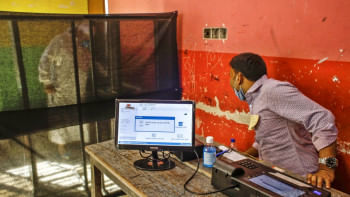


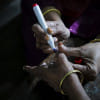
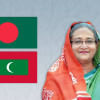

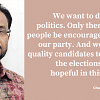
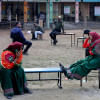

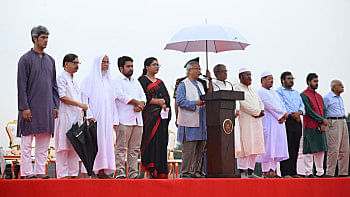
Comments